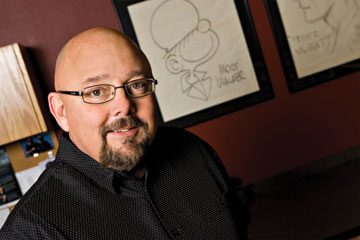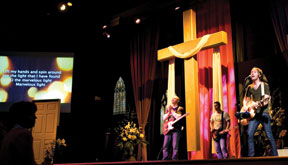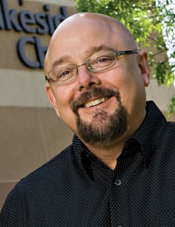
 Mike Klockenbrink, Chief of Staff, Lakeside Church, Folsom, CA
Mike Klockenbrink, Chief of Staff, Lakeside Church, Folsom, CA
By Ronald E. Keener
When Mike Klockenbrink’s company transferred him to Northern California, he and his wife began visiting Lakeside Church in Folsom, CA. It was their second visit there that he told his wife that God wants them there for some reason. “I don’t know why yet, but He wants us here,” he recalls. Before long the industrial supply company he had been with for 16 years offered him another promotion. “It was that old game when I got offered one of those jobs from my company that was going to be a dream job. I was looking for advice on it,” he says, and his wife urged him to talk with senior pastor Brad Franklin.
Brad promptly asked him when he’ll stop climbing the corporate ladder and start climbing the Kingdom ladder. “Oh, dagger in the heart,” he recalls. “Well, that was my answer. I got off the phone, called my boss and said, no, thank you, and shortly thereafter I was offered a position here at Lakeside as our first business administrator and left the other company a little over nine years ago.”
Church Executive spoke with Klockenbrink about his role at Folsom Church and how the congregation manages for growth.
Your title is a little different from most others. Is the role any different from that of an executive pastor?
It’s not, but there’s a reason for it. Senior Pastor Brad Franklin is a major fan of the television show, “West Wing.” So when this role opened up, Brad said he thought of me as the Chief of Staff.
I asked him if that meant he was president? He said, no, I’m the senior pastor, but you’re going to be chief of staff.
What is it like living in Folsom?
We are about 25 miles east of Sacramento. That puts us about dead center between Lake Tahoe and San Francisco, so you can go skiing or go down to the ocean all in the same day.
There’s a prison here in Folsom too?
Yes there is. It’s the one that Johnny Cash sings about. There’s a popular myth that he spent time there in prison, but that’s not true.
The region around Folsom is one of the fastest growing in the state?
The suburbs around Sacramento have been booming since about 1985. And churches have noticed. Strong churches have been planted in Rocklin, Granite Bay, Orangevale, Folsom and El Dorado Hills over the last 10 years. What has been happening at Lakeside is not an isolated event.
You’re a church of 2,600 on weekends, affiliated with the Next Generation Churches, and reaching beyond its local area.
The mission of Lakeside is to be a regional church for the tri-county area around Folsom. We have been sending out missionaries since 1990. Since 1996 we have been sending out our own teams on short-term missionary trips to such places as Guatemala on construction projects and Russia for door-to-door evangelism. We’ve built houses in Mexico for the homeless and participate in the Adopt-A-Child program in New York. Lakeside’s task is to permeate the boundaries between the church and the community.
Is it more difficult to reach people for Christ in this area?
At Lakeside we have a very contemporary environment and our music is going to be a bit more edgy. In our lobby you’d notice that we have acid stained concrete floors, different colors on the walls, flat screen monitors and live broadcasts of the gathering — the place is alive and not sterile! It makes people feel comfortable here.
We opened our first multisite campus in Orangevale last September that is meeting in an elementary school auditorium.
Brad Franklin has always had the dream of being a teaching church, so he does many things to help other churches in the surrounding area. He gives the staff the freedom or autonomy to pull out and work with other churches within the region. We’ve hosted Willow Creek’s Leadership Summit for about six years, which is a big thing for us here.
Your business life took you from northern Illinois to southern California where you had the opportunity to attend both Willow Creek and Saddleback churches?
I had the opportunity to experience some big churches. I grew up Lutheran, converted to Catholism because my wife was Catholic, but I didn’t have a personal relationship with Jesus. I knew Jesus as a kid but it wasn’t until we got invited to Willow Creek and actually experienced it. That’s where my wife and I both accepted Christ, and got baptized there at Willow.
 What sets Lakeside apart as a church?
What sets Lakeside apart as a church?
Our outreach pastor, Jeff Kreiser, is a phenomenal guy who we brought on staff about five years ago. He has been able to rally teams together for initiatives that we call Impact Folsom or Impact Orangevale, where our multi-campus site is. What that means is we want to make an impact on the local community. We will gather together 200 to 300 people at a time and go into the community and do community projects.
We’ve adopted a school here where some of the kids are less privileged. We have people go in and read to the kids or tutor with them, and we do that on a regular basis.
We go through computers here on a somewhat regular basis and we don’t just discard them. We refurbish them and give them to some of the local schools. We also work with Powerhouse Ministries here in town, which ministers to the homeless or those who have addictions.
If people can get involved, if they can have an experience learning what church can be, that’s when they start to believe that they’re a part of something bigger than themselves.
You hold a blue belt in karate. Are there any disciplines that a chief of staff can learn from karate in administering a staff of 70 with 12 direct reports?
I love karate. I’ve just gotten out of it but I’ve done it on and off throughout my life, and the part that I like about it is there are many different disciplines and one that the majority of karate instructors teach you is stretching.
If you don’t stretch and limber up, you’re going to get hurt. When I apply that to work here, I need to stretch my goals and stretch my mind in the way I think. The one thing I try to do as a leader is stretch people to get them outside their comfort zone — and help them make their comfort zone a little larger. Karate also taught me endurance and how to prepare for difficulties.
In bringing your business background to the church, does the staff go through performance evaluations and goal setting?
We do, I think it’s important. For me it’s important that we sit down and do a self-evaluation twice a year. You’ll write your own review against certain criteria. You’ll write what you believe your strengths are, what your weaknesses are, and what you’re going to do to improve in these areas.
People are really hard on themselves. I look at what the goals are that you’ve achieved during the last six months, what are the areas that you’ve missed. None of it is punitive. It’s more of a look at how can we help you succeed? None of this should come as a surprise because we try to have open discussions with people on a regular basis. My goal is to remove the barriers that are stopping people from being successful.
You brought much of that from the business world?
I think sometimes people get caught up in managing too much and leading too little. I’d rather lead people through a process and let them do their job. Nobody wants to walk into work and say, “Hey, how can I mess up today?” They want to come in and do their jobs.
How “MBA-oriented” are you on the management of the church?
In day-to-day operations we use management by objectives (MBO). I believe in letting people do their jobs. Every person I sit with in a review, my comment is if you’re doing the same job today that you’re doing one year from now, I have a problem with that. You need to be growing.
You need to be continually challenging yourself. I ask everybody on staff at least twice a year to get outside our church and visit another church with people in that type or similar job and see how they do it. What can you learn from them? Build a relationship with somebody outside these four walls.
What is the difference between the business world and the church world?
In a lot of respects there are very similar. You get a lot of people who don’t like the fact that the church runs like a business but it really does. We are in a different type of business and that’s where some of this forecasting or marketing works in. You don’t actually have a product; we are in the business of bringing people into a relationship with Jesus, plain and simple.
But the thing I have found interesting for me is that in the corporate world the relationships are business relationships; in the church there are personal relationships. So that anything that we do as a church, I’m going to feel that impact. I’m going to see those people on a weekend and I will see those people in the community.
You know if people apply for a particular position and they don’t get it, I may turn around and say, by the way, would you be willing to serve over here. It is like I’m not good enough to hire but I am good enough to serve. I take hiring very seriously; I want to make a good marriage between that person and the church.
You’ve been president of the area NACBA chapter for three years. What has the organization meant to you?
Bill Hybels’ Holy Discontent rocked my world, rocked it in regards to what are the things that are just hurting your soul. For me it is the local church, and I am just saddened by what I see. As Hybels would say, if you can change your city, you can change your region, you can change the world. I have a passion to see this local chapter here, in the Sacramento area, grow and succeed and really make a difference in this region for the local church.
PROCESS IMPROVEMENT: ‘How can we save money, how can we do this better?’
 Mike Klockenbrink brings to his work an enormous respect for processes, systems and quality improvement. Church Executive asked him about these aspects of his job and how he applies them in making progress for the congregation.
Mike Klockenbrink brings to his work an enormous respect for processes, systems and quality improvement. Church Executive asked him about these aspects of his job and how he applies them in making progress for the congregation.
Intentionality as the central focus.
The key is intentionality. If you want to improve any process at all, it must start at the top. I don’t mean that the leadership or management must come up with all the ideas of improving a process; they must lead the charge to change. How many times have you heard people say why do we have to do it that way, we could save so much money, or speed up this process if they would only listen. I learned a simple process from the Thomas Group while working for my prior employer, called the 5 I’s, that I use today.
Inspire your people by setting a clear vision and objectives for your church. Remove the barriers that are in the way, and empower your staff to improve the processes and provide recognition for their accomplishments.
Identify bottlenecks along the way. What resource requirements in either people/capital are needed for success, and what are the expected/desired results?
Information must flow back and forth as you allocate skills/resources needed to accelerate progress. Lead your staff to a process mindset from a functional mindset.
Implement the necessary disciplines for continuous improvement. Reallocate resources needed to remove barriers and support improvements. Provide objective feedback on attainment of results.
Institutionalization is when this becomes second nature. It’s the way we do things around here. Measure for success and continue to encourage problem solving activities.
What he considers his first job at the church.
There are different processes throughout the church and mine is looking for continuous improvement. How can we save money, how can we do this better? Just because someone has an idea today that was an idea five years ago doesn’t mean that’s it’s a bad idea. People tend to shoot something down saying we’ve done that before. Well, things might be different today, so you’ve got to look at it. Everybody’s got a different set of eyes.
I don’t care if you’ve been with us one day or 1,000 days if you’ve got a better way of doing something, I want to hear about it. And that’s not just for your own department, that’s for the whole church and I expect you to be continually looking for a way to improve things.
Examples of using process improvement.
Just recently our communications director, Lisa Lorraine-Eneqvist, said she could improve on how we communicate with our weekly bulletin. We call it the View. It used to be trifolded with a number of inserts. She identified how many we give out and how many come back. Now we’re going to a smaller size, single sheet and it will save us about 45 percent of the annual cost that we were spending. That’s an improvement. People need to look at how we do things.
We are located on 29 acres here. Facilities Director John Norris was struggling with the watering process and making sure that everything is getting covered. We hired an outside company to come in and evaluate and manage the process for us so that we could water cycle everything as needed. It saved us a ton just on water as well as keeping the grass green.
Applying a business career to the church’s management.
I was the regional quality manager in Southern California with my last company; my job was all about continuous improvement or total cycle time. From the time a need was identified to the time the need has been satisfied, how do you measure that, how do you improve that? What are the statistics you look at and how do you measure that particular process? What are those barriers that are stopping that process from succeeding?
I have been able to implement some of that. As a leader one of those processes or improvements is removing the barriers that are keeping people from doing their jobs.
On forecasting growth, service goals and productivity?
You must ask the following questions: What is the vision of the church, where is it that we are going, what is it that we want to accomplish? Then have the staff develop its goals for the next 18 months based on these questions and answers. You can identify the impact on growth and finances, and more.
From there we can develop some good goals and look at staffing. We meet as a management team a couple times a year just to talk about staffing. We truly work as a team. We are here to fulfill His mission not ours. I will not tolerate silo mentality when we work as a team; people must be willing to put aside their own personal needs for the greater need of the team. This is how a high performance team operates.


